Croatia Is Fighting the Conservative Revolution - UPDATED
Adelina Marini, June 2, 2016
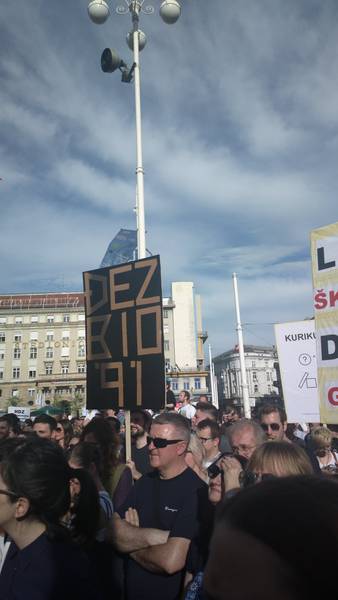
There is something big happening in Croatia. So big, that it gathered almost 50 thousand people out in the streets of 11 Croatian cities. Even bigger, for it touches on a sensitive issue in the country. Often those, who participated in the war for separating Croatia from former Yugoslavia ask politicians, or simply people with differing opinions “And where were you in ‘91?”. The question is often reproachful and means “did you take part in the war”, which presumably gives you the right to an opinion. This question is often used by the younger generation as a joke, or mockery the older one.
For several days now the question in Croatia is: “Where will you be on 01.06.2016 at 6 pm”. This is when a protest, supporting the educational reform, without the intrusion of politics, happened. The reform is known as the “curricular” reform, because its goal is to modernise the contents of Croatian textbooks. Asked in this manner, the question clearly shows that the educational reform is the new Croatian national goal, after gaining state independence. The most conservative circles in the country, close to the Catholic Church, put a spoke in the wheel of the reform.
The curricular reform has been making the headlines in Croatia for over a week, after it became clear that the new Minister of Education Predrag Šustar from the conservative Croatian Democratic Union (HDZ) party only supports the reform in words. The stalling of the start of the reform led to last week’s resignations of the expert working group, headed by the young Doctor of sciences Boris Jokić. Another reason for the workgroup’s resignations is heavy political pressure. There has been talk of a comprehensive educational reform in Croatia for several years, after having a new educational strategy drafted by the former social democratic-liberal government. The strategy was approved by parliament in 2014 and in the beginning of 2015 the previous educational minister, Vedran Mornar, set up the expert workgroup with the task of preparing a change of curriculum for the pre-school, primary, and secondary education and training, meaning the removal of obsolete teaching plans and programmes and changing educational methods.
Problems with the reform began with the arrival of the new government, made up of a coalition with the Patriotic coalition as senior partner. The Patriotic coalition is made up of the largest political party in the country, the Croatian Democratic Union, which under the leadership of Tomislav Karamarko did a sharp turn towards the far right, and of several smaller parties, some of which ultra-conservative as HRAST. There is much talk in Croatia that it is exactly HRAST, led by Ladislav Ilčić, that is behind the attempts to hobble the reform. If you recall, euinside named Ladislav Ilčić “the Croatian Donald Trump”, because of his controversial statement about Muslims. In the case of the curricular reform Mr Ilčić insists that more members are appointed to the workgroup, who would monitor the experts’ work. This gave rise to concerns that the new members could serve as censors. Moreover, as Jutarnji list explains, all members of the workgroup are appointed after a competition and any possible appointment without a competition would raise suspicions of 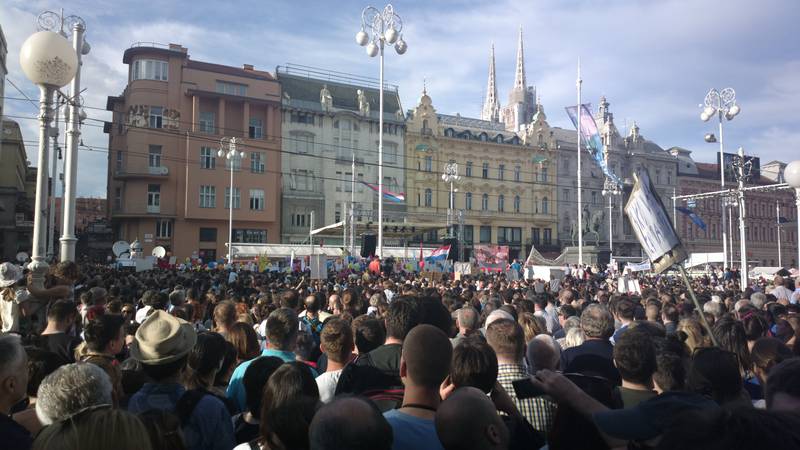 political interference. Besides, former educational minister Vedran Mornar was also not a political figure.
political interference. Besides, former educational minister Vedran Mornar was also not a political figure.
According to Ladislav Ilčić, however, appointments are politically motivated. So, he insists on electing a new workgroup, whose work will go along the current government’s ideas on education. The current government and the Patriotic coalition in particular are fighting for a “conservative” revolution, similar to what is going on in Poland, but resistance against this seems strong. The expert workgroup believes there is not enough support from state institutions, including a financial one, after it turned out that travel expenses of workgroup members are not covered. In general, the workgroup’s operation is voluntary, but travel expenses should be reimbursed by the state.
Problems with the reform appeared at the peak of a heavy political crisis, which Croatia is in at the moment, caused initially by the inability of coalition partners to work together. Another problem are the numerous scandals, the latest of which concerns Deputy Prime Minister and HDZ leader Tomislav Karamarko, who is accused of a heavy conflict of interests. At the moment, the government is practically non-functional and it will remain so until the decision of the Commission for the Establishment of Conflict of Interest is published and the non-confidence vote against Mr Karamarko passes, the deadline for which is June 18.
Because of the politicising of the reform and its blocking, over 200 non-government organisations, unions, and celebrities organised mass protests in several Croatian cities and abroad. Tens of thousands showed up in the central squares of these cities. Before the protest, over 35 thousand people had signed petition supporting the reform and over 15 thousand have confirmed their participation in the protests on Facebook. Many more showed up.
According to Ladislav Ilčić and other members of the ruling coalition, the protest is politically motivated and is anti-governmental in its essence. In an attempt to find a solution to another scandal in this government, President Kolinda Grabar-Kitarović, who got elected to the post exactly from the HDZ list, intervened with a key role. On Tuesday, she published an open letter, giving strong support to the expert workgroup, headed by Dr Jokić and swore that she will do everything in her power to de-politicise the reform.
In her letter, she states that she addresses everyone not only in her capacity of head of state, but as a mother. “Education should comply with the needs of the labour market, but also be constantly aware of new technologies and new knowledge”, starts her letter. Croatia is third after Greece and Spain in youth unemployment levels with one of the reasons pointed out by economic analysts and the European Commission being the lack of connection between education and the needs of business. “However important it might be for someone to learn all about parts of the body and the feeding habits of arthropods or how many kilogrammes of rice do residents of certain Asian countries eat per year, or about which 19-th century novel is important to national 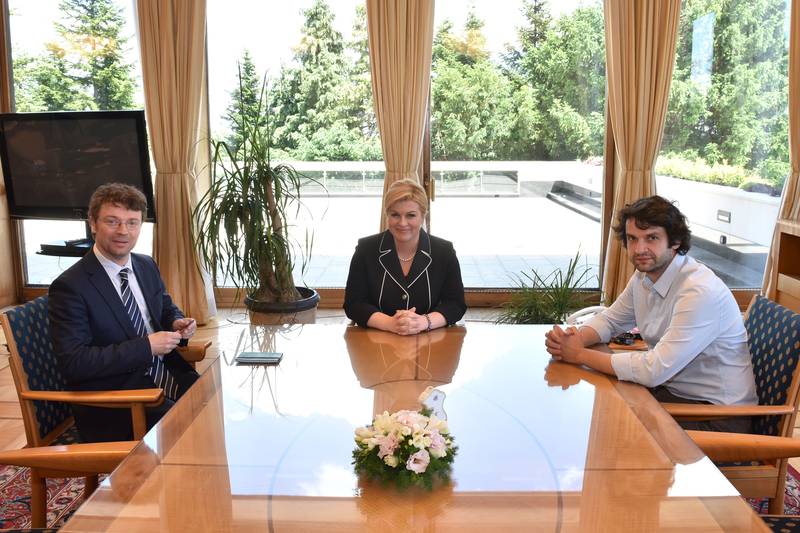 literature, it is much more important to gain knowledge, without which it is impossible to succeed in the 21st century”, continues the letter of Ms Grabar-Kitarović.
literature, it is much more important to gain knowledge, without which it is impossible to succeed in the 21st century”, continues the letter of Ms Grabar-Kitarović.
Her formula for present day education and for the future is science, technology, engineering, and mathematics (STEM). This does not mean, she warns, that you should not teach anything else, but “it is an indisputable fact that those countries, which placed emphasis on STEM, have benefited significantly in their overall development, based on innovations”. The president gave South Korea as an example. Kolinda Grabar-Kitarović also sent a quite unequivocal message to those attempting to ideologise education: “Croatia has many competences and much knowledge, but we should learn to cast off the burden of nostalgia and some very outdated traditions. Searching for solutions in old recipes and old accomplishments is leading us along a wrong path and is driving us backwards. It does not lead us forward”, says the head of state in her letter.
Besides that, Ms Grabar-Kitarović also organised a meeting between Minister Šustar and Mr Jokić, which concluded with an agreement that the work of the expert group will continue. This is the first considerable intervention of the president in the work of the government, or rather in the lack of work of the government. Support for the reform has already been stated by the union of Croatian employers, by the Chamber of Commerce, the Croatian Chamber of Crafts, and many intellectuals. The reform is also supported in the in-depth analysis of the European Commission under the European semester from this year. It says that Croatia is underperforming regarding the access to and quality of education. There are large regional differences in the availability and quality of early childhood education and care. Croatia has the lowest rate of participation in education of children aged 4 to 6 in the EU – 71.4%. According to a study by PISA, a third of 15 year-old students have no mathematical skills, which shows weaknesses in education.
Acquiring digital skills is hampered by delays in the digitisation of education and inadequate ICT infrastructure in schools. At the same time, however, the report says that Croatia has taken “ambitious steps” towards improving the quality of education. And while the access to education remains a problem, the quality of early child education is improving with the implementation of a new national curriculum in the 2015/2016 school year. The report also speaks of the comprehensive curricular reform, which was mentioned above. If many people gather in the squares all over Croatia and abroad tonight, it will be a clear sign that Croatian society wants a future in the 21st century and is turning its back to conservatism. The latter being another signal to part of the government that they are on the wrong path, placing their partisan interests above the national ones.
On June 1st 2016 at 6 pm I was at Ban Jelačić Square!
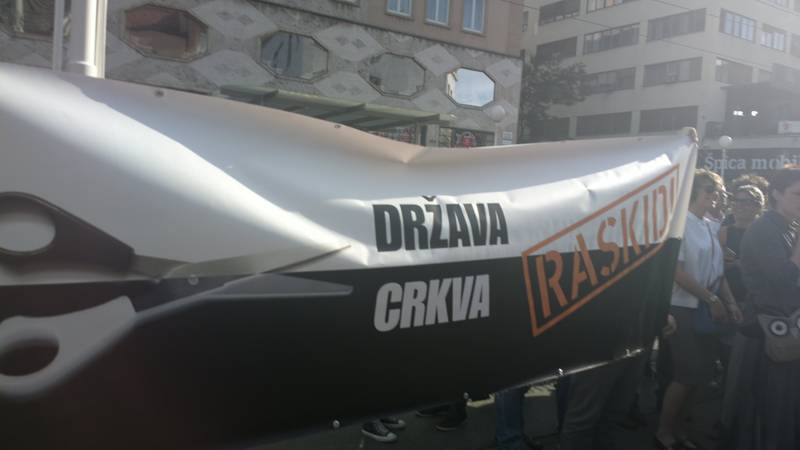
Many Croats shared in social media after the protest that they were at the square on June 1st 2016 and with their presence they stated clearly that they want education that is free of the obsolete 20th century ideologies. Education, which will prepare their children for the 21st century, where, as some of the speakers of the protest said, jobs connected to digital technologies will matter. The central square of Zagreb was bursting on Wednesday evening. Around 6pm thousands of people of all ages were flowing in from neighbouring streets. There were many parents with their children, some of them newborns, others with special needs. It was full of disabled war veterans, high-school and university students, Croatian celebrities. They were adamant in rejecting the Catholic Church and politicians’ intervention and advocated in their banners for critical thinking, for education which evaluates personal thinking, not someone else’s thoughts. “We don’t need no thought control” said some of the banners, quoting lyrics from the famous Pink Floyd song “Another Brick in the Wall ".
Organisers extended four demands to the authorities:
- To guarantee the freedom of experts to complete their work on the reform without pressure, intervention, or censure;
- Parliament is to vote on a resolution supporting the reform and the expert team;
- Education is to be raised to the level of strategic national interest;
- Funds and autonomy are to be provided for the completion of the reform.
According to them, this is the first reform, which is “ours”, meaning a reform of the teachers and professional circles. While waiting for the start of the protest during the day, the representative of the most conservative circles in Croatia – leader of the “In the Name of Family” association, which turned into a political party for the parliamentary elections last year, but never managed to pass the election threshold, proposed a list of books to be banned and not be taught in school, because they create “pornographic addiction” in children. Among the authors to be banned, alongside many Croatian writers is the Japanese author Haruki Murakami. Željka Markić initiated the referendum, which put an explicit note in the Constitution that marriage is between a man and a woman only.
She belittled the protest by saying that “only” 25 thousand people showed up at Zagreb’s central square, which was supposed to mean that all the rest of the Croats support a more conservative approach. Non-governmental organisations, united for the protest under the slogan “Croatia can do better”, feel that the reform they are working on will not be the best, but they are convinced that it will be the first step towards stopping the outflow of young Croats in search of a better life and towards the modernisation of Croatian education. The square in the centre of the Croatian capital was full of potential emigrants on Wednesday evening. Exactly the ones, who Tomislav Karamarko, leader of the conservative Croatian Democratic Union (HDZ), was claiming before the elections do not want to leave. This was one of his more popular ideas in the election campaign last autumn. Some of the banners at the protest, however, claimed bad education breeds good voters, or that the uneducated become HDZ members.
The organisers put a lot of effort into protecting the protest from the appetites of political leaders to mount it. In this sense there was an incident in Rijeka, where a member of the junior wing of the Social-Democratic party was asked to leave the protest. At one stage of the protest, the resignation of Education Minister Predrag Šustar was asked for, but in general the protesters’ requests boiled down to just keeping politics out of education. In this the tens of thousands of Croats have the full support of President Kolinda Grabar-Kitarović.
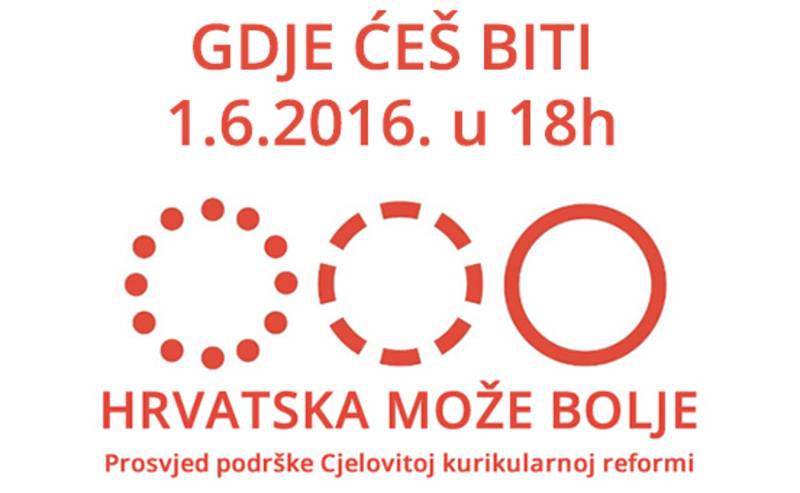
The protest of June 1st 2016 is not the first occasion, on which Croats unite behind a cause, which seems unusual. Before the start of the rally there was much talk that hopes are for it to replicate the success of the protest in support of ... a radio station. We are talking about Radio 101, which started back in 1984 as an independent radio station. It was famous for the contemporary Western music at the time and with its breaking news. In the beginning of the 90’s of last century the station fell victim to its criticism towards the HDZ government of the time, led by the late President Franjo Tuđman. Because of its criticism towards the ones in power, authorities took away its license. This unleashed mass protests. According to some sources, over 100 thousand gathered at the central Ban Jelačić Square in Zagreb
The protest grew into a fight for democracy and independent journalism. Those events unfolded in 1996 – 9 years before Croatia started its EU accession negotiations (2005). Thanks to the protests the radio station survived. It is still “alive” today on air in Croatia. Many people in the square recalled how they were at the same spot 20 years ago. Ironically, it is again the HDZ that is in power today and it seems like lessons were not learned, because the first steps of the new government, headed by the bipartisan Prime Minister Tihomir Orešković, were pointed at media repressions, as euinside reported. Under pressure by the HDZ the beheading of key state institutions started. At the moment, the fate of the Chief Prosecutor Dinko Cvitan is on the line, whose term only began last year.
The protest of Wednesday evening was a clear message that Croats view as patriotic the fight for an education free from ideology and not the false gestures of politicians, who present themselves as patriots, but are involved in an alleged conflict of interests. Let’s hope they succeed, for this will also be a strong message to the EU, where the shadow of the past is ever growing, swallowing more and more members – both old and new. Before Croatia’s accession in 2013 there were hopes that it will be the white swallow of enlargement, which will prove that transition is possible. This is the second test both for the EU and Croatia. Some of the banners last night said that “we are not going to fail this exam”.
Translated by Stanimir Stoev
 Kolinda Grabar-Kitarovic | © KGK
Kolinda Grabar-Kitarovic | © KGK Jozo Rados | © European Parliament
Jozo Rados | © European Parliament Aleksandar Vucic, Andrej Plenkovic | © Vlada RH
Aleksandar Vucic, Andrej Plenkovic | © Vlada RH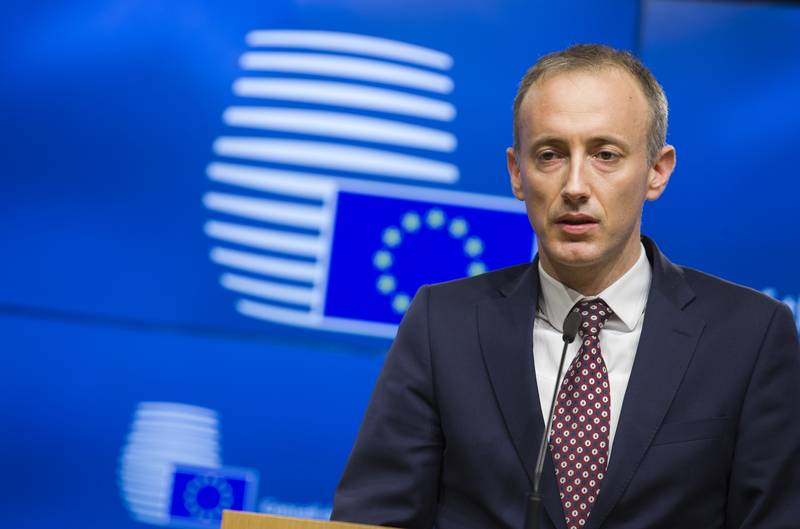 Krasimir Valchev | © Council of the EU
Krasimir Valchev | © Council of the EU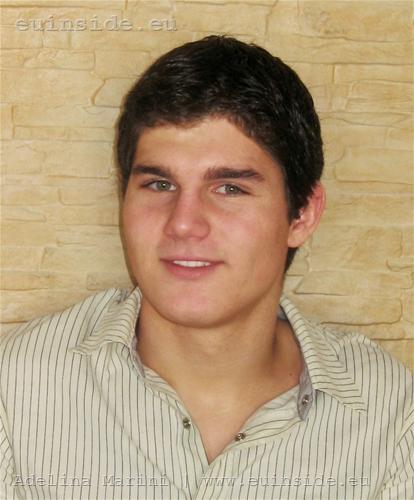 | © euinside
| © euinside | © EU
| © EU